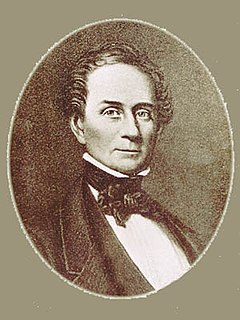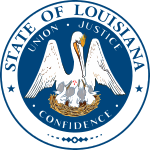
Claiborne Parish is a parish located in the northwestern section of the U.S. state of Louisiana. The parish was formed in 1828, and was named for the first Louisiana governor, William C. C. Claiborne. As of the 2020 census, the population was 14,170. The parish seat is Homer.

Franklin is a small city in, and the parish seat of, St. Mary Parish, Louisiana, United States. The population was 7,660 at the 2010 census. The city is located on Bayou Teche, southeast of the cities of Lafayette, and New Iberia and 22 miles (35 km)) northwest of Morgan City. It is part of the Morgan City Micropolitan Statistical Area and the larger Lafayette-Acadiana combined statistical area.
The Methodist Protestant Church (MPC) is a regional Methodist Christian denomination in the United States. It was formed in 1828 by former members of the Methodist Episcopal Church, remaining Wesleyan in doctrine and worship, but adopting congregational governance.

In the 1828 and 1829 United States House of Representatives elections, while Jacksonians soundly took control of the presidency, with Andrew Jackson's victory, they greatly increased their majority in Congress. Outgoing President John Quincy Adams's unpopularity played a major role in the Jacksonian pick-up, as did the perception of the Anti-Jacksonian Party as urban and elitist. Major increases in suffrage also heightened Jacksonian wins, as newly enfranchised voters tended to associate with Jacksonian principles. The Anti-Masonic Party, a single issue faction based on distrust of Freemasonry, became the first third party in American history to garner seats in the House.

Henry S. Johnson was an American attorney and politician who served as the fifth Governor of Louisiana (1824–1828). He also served as a United States representative and as a United States senator.

Alexandre Mouton was a United States senator and the 11th Governor of Louisiana.
Thomas Butler was a member of the U.S. House of Representatives from 1818 to 1821 representing the state of Louisiana. He served one and a half terms as a Democratic-Republican.

Edward Douglass White was tenth Governor of Louisiana and a member of the United States House of Representatives. He served five non-consecutive terms in Congress, as an adherent of Henry Clay of Kentucky and the Whig Party.

Philemon Thomas was a member of the United States House of Representatives representing the state of Louisiana. He served two terms as a Democrat (1831–1835).

Pierre Augustin Charles Bourguignon Derbigny was the sixth Governor of Louisiana. Born in 1769, at Laon, France, the eldest son of Augustin Bourguignon d'Herbigny who was President of the Directoire de l'Aisne and Mayor of Laon, and Louise Angélique Blondela.

Robert Bullock was an American state legislator and a United States representative from Florida. He was a brigadier general in the Confederate States Army during the American Civil War.

David Hubbard was a U.S. Representative from Alabama born near the town of Old Liberty, Bedford County, Virginia, and a cousin of Sam Houston.
George H. Proffit was an American lawyer who served two terms as a U.S. Representative from Indiana from 1839 to 1843.
Taylor Webster was an American newspaperman and politician who served three terms as a United States Representative from Ohio's 2nd congressional district from 1833 to 1839.

Thomas Irwin was a United States representative from Pennsylvania and a United States district judge of the United States District Court for the Western District of Pennsylvania.

Thomas Bolling Robertson was an Attorney General of the Orleans Territory, Secretary of the Louisiana Territory, a United States representative from Louisiana, the 3rd Governor of Louisiana, Attorney General of Louisiana and a United States district judge of the United States District Court for the Eastern District of Louisiana and the United States District Court for the Western District of Louisiana.
Alexander Pope Field was an American lawyer and politician. He was the 21st Attorney General of Louisiana, the 6th Illinois Secretary of State, and the 4th Secretary of the Wisconsin Territory.
In the 1828 and 1829 United States Senate elections, the Jacksonian coalition, despite its leader's victory in the presidential election, lost a seat in the Senate to the opposing Anti-Jacksonian coalition.

The 1828 United States presidential election in Louisiana took place between October 31 and December 2, 1828, as part of the 1828 United States presidential election. Voters chose five representatives, or electors to the Electoral College, who voted for President and Vice President.

The 1860 United States presidential election in Louisiana took place on November 6, 1860, as part of the 1860 United States presidential election. Louisiana voters chose six representatives, or electors, to the Electoral College, who voted for president and vice president.














